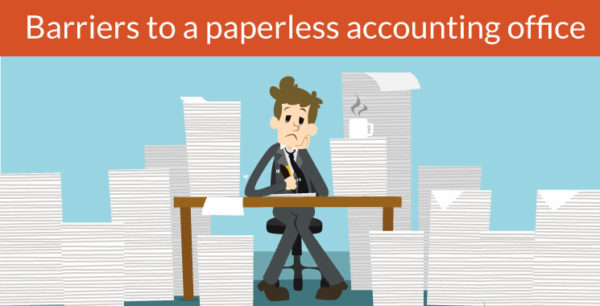Topics: Finance and Accounting Transformation
The five big barriers to a paperless accounting department
Posted on November 04, 2016
Written By QX Global Group

Almost all CEOs say that they want it. Most FCs, FDs and CFOs would nod their head if you asked them about it.
There’s no doubt about the paradigm shift in document management – paperless is the future. But this theoretical understanding often doesn’t translate into reality. While the term ‘paperless office’ is often spoken of with approval and even enthusiasm, not many businesses are actually paperless.
What’s the problem? Why do accounting departments or accountancy firms find it difficult to transition to a paperless office?
From my experience, the biggest reason is that adopting and implementing a paperless accountancy or accounting department takes a sustained and dedicated effort. It also requires the business to make a number of changes in the existing work processes. Here are some of the key reasons that prevent businesses from a successful transition to a paperless office.
1. The challenge of getting employee buy-in
Individuals who have worked with paper for their whole lives (and made it work well!) will naturally be resistant to change. When you introduce a document management solution, it will impact the entire work process and force your employees to learn a new software system. Many attempts at a paperless office fail owing to a lack of acceptance from the employees. To clinch employee buy-in, explain the benefits of the new systems to your staff, take their suggestions and make them a part of the decision.
2. Fear of a huge backlog
While most accounting leaders are more than willing to go paperless right now, it is the large volume of papers accumulated over the years that scares even the bravest. For firms or departments that have been operating for years, the initial effort that needs to go into digitising existing documents often acts as a barrier. If you are unsure, it is best to perform a cost-benefit analysis – more likely than not, you will realise that the investment of time, money and effort for implementing a paperless way of working will be more than worth it.
3. You are part of a large paper-based network
This can be the biggest deal breaker. When your clients or other departments within the organisation send the data in the form of paper, it can be rather difficult to go paperless. This problem can be overcome by scanning and digitising the documents as soon as they come in. Working in tandem with other department or clients to adopt a paperless solution can also be an option – they are also likely to be looking at digitisation of documents.
4. Printed documents are the only option
Government regulations may demand that in some scenarios you must maintain paper documents. Digitisation will not be able to avert the need for paper in such situations. Also, there may be legal requirements that necessitate the use of signed paper documents. However, these are exceptions to the rule – most of the documentation can still be securely digitised.
5. Clinging to paper after going paperless
Even after you are done with all the heavy lifting and have a paperless solution in place, you won’t reap all the benefits if your employees still cling to paper. Too many accounting departments digitise the data, but maintain hard copies at the same time. While this approach is understandable for the most important documents, there will be a moment when you will have to let go of the paper! If your paperless document management solution is secure and it is working as expected, get rid of your reliance on hard copies.
Paperless offices are the future
Needless to say, going paperless is not as easy as one-two-three. There may be certain governmental or internal constraints that force you to use paper documents; but, a vast majority of your paper documentation can easily be digitised. And when you consider the benefits that a digitised, paperless document management system can deliver, you will realise that it is worth the effort. By implementing a paperless office, you can:
- Reduce the amount of effort needed to organise and file paper documents
- Substantially reduce the time taken to search and find information from documents
- Make data available for access to authorised users on mobiles
- Cut expenses related to the storage and maintenance of documents
- Secure data from destruction or loss by backing up business critical information
- Reduce your carbon footprint by slashing the amount of paper your business consumes
All of the above possibilities are well within your reach. Best of luck for your digitisation and paperless-office projects!
Originally published Nov 04, 2016 12:11:16, updated Jul 23 2024
Topics: Finance and Accounting Transformation







